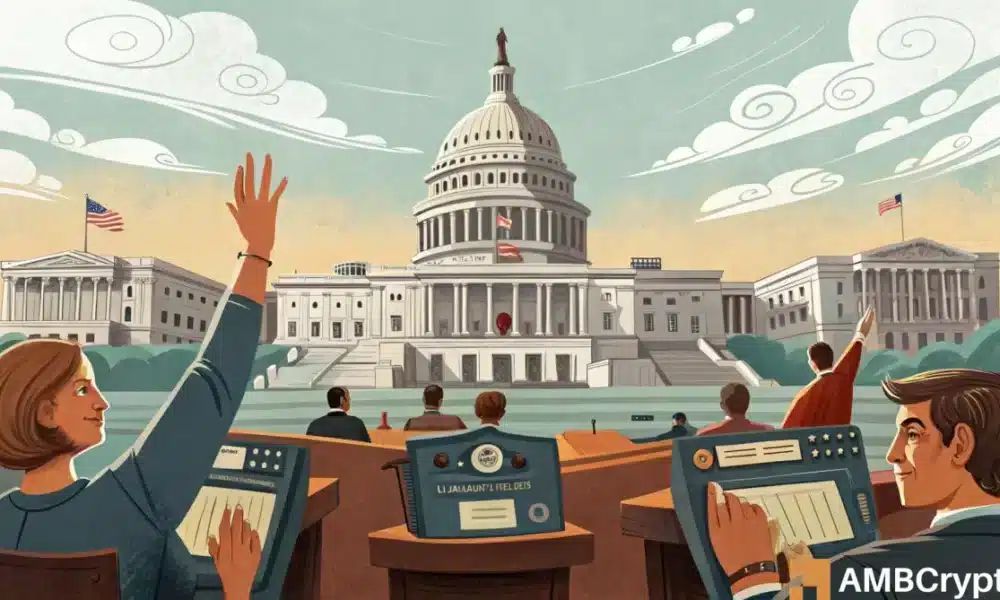The Growing Legitimization of Bitcoin in Traditional Lending
In recent developments, the intersection of cryptocurrency and traditional finance is gaining momentum, particularly highlighted during Washington’s much-anticipated ‘Crypto Week.’ Despite initial setbacks, the introduction of a new mortgage bill represents a pivotal step toward integrating Bitcoin into conventional lending practices. Meanwhile, nations like El Salvador and Pakistan are making strides in utilizing cryptocurrency at a national level, indicating that irrespective of the U.S. legislative struggles, the global sentiment towards Bitcoin is evolving.
The Introduction of H.R. 4374
On July 14, 2025, Representative Nancy Mace from South Carolina introduced an innovative bill known as H.R. 4374. This legislation seeks to modernize mortgage evaluations by revamping the federal underwriting systems. The primary objective of the bill is to mandate lenders to account for cryptocurrency assets, specifically those in brokerage accounts linked to exchanges, when evaluating mortgage applications. The bill has already been assigned to the House Financial Services and Veterans Affairs Committees, marking the beginning of what could be a transformative journey for integrating crypto assets into the mortgage approval process.
Implications of the Mortgage Bill
Should H.R. 4374 become law, it would facilitate the inclusion of cryptocurrency holdings like Bitcoin (BTC) directly into mortgage applications. This marks a significant departure from current practices where applicants must convert their crypto into fiat currency and hold it for a predetermined period. The proposed legislation aims to eliminate this requirement, allowing borrowers to utilize their digital assets for meeting reserve and repayment criteria without the need for liquidation. This is a game changer for younger, tech-oriented generations who are already familiar with digital currencies and seek to enter the housing market.
A Warm Reception from Financial Experts
The potential for this bill to reshape standards in mortgage evaluations has not gone unnoticed. Financial experts like Cathie Wood of ARK Invest have expressed strong support, noting that this legislation could bolster Bitcoin’s integration into mainstream finance. By making it easier for younger, crypto-savvy buyers to qualify for home loans, the bill not only enhances accessibility but also aligns with a broader trend of digital asset acceptance in financial transactions. The backing from influential figures in the finance sector highlights the growing importance of cryptocurrency in everyday economic activities.
Benefits for Veterans
In addition to modernizing mortgage criteria for the general public, H.R. 4374 also proposes significant enhancements specifically for veterans looking to secure VA-backed mortgages. The ability for veterans to include their digital assets in mortgage applications could provide them with greater financial flexibility and improved chances for home ownership. The bill’s holistic approach underscores the importance of considering diverse asset types in mortgage evaluations, catering to a wider array of applicants and driving greater inclusivity in the housing market.
The Global Crypto Landscape
While the U.S. continues to grapple with its internal struggles regarding cryptocurrency legislation, other countries are making rapid advancements. Recently, Pakistan and El Salvador have forged a significant partnership centered on the use of Bitcoin, particularly focusing on its application in public sector utilities and expansion of national BTC reserves. This emerging collaboration illustrates a growing recognition of cryptocurrency’s potential to drive economic growth and innovation across diverse sectors. While U.S. politicians remain divided on how to regulate Bitcoin, these international moves underline a global trend in favor of embracing cryptocurrency technologies.
A Divided U.S. Congress
Despite the tangible progress seen elsewhere, the legislative scene in the U.S. remains fractious. Although the crypto-focused reforms took a backseat, Republicans succeeded in passing the ‘One Big Beautiful Bill Act’ with a tie-breaking vote from Vice President JD Vance. The contrast between the rapid advancements in other countries and the stagnant discussions in U.S. Congress highlights the pressing need for coherent Bitcoin regulations. As various global entities work towards leveraging cryptocurrency for economic development, the fragmented U.S. stance could risk falling behind in the fast-evolving world of digital finance.
In conclusion, the intersection of cryptocurrency and traditional lending is approaching a pivotal moment with the introduction of innovative legislation like H.R. 4374. Globally, countries are forging ahead, incorporating Bitcoin into their economic frameworks, while the U.S. must improve its legislative efforts to remain relevant in the evolving landscape of finance.


